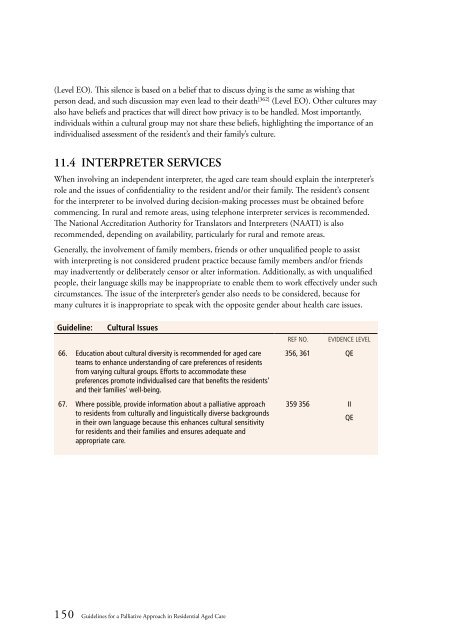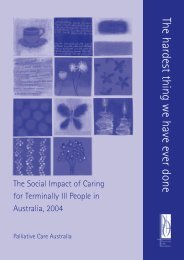Guidelines for a Palliative Approach in Residential Aged Care
Guidelines for a Palliative Approach in Residential Aged Care
Guidelines for a Palliative Approach in Residential Aged Care
You also want an ePaper? Increase the reach of your titles
YUMPU automatically turns print PDFs into web optimized ePapers that Google loves.
(Level EO). This silence is based on a belief that to discuss dy<strong>in</strong>g is the same as wish<strong>in</strong>g that<br />
person dead, and such discussion may even lead to their death [362] (Level EO). Other cultures may<br />
also have beliefs and practices that will direct how privacy is to be handled. Most importantly,<br />
<strong>in</strong>dividuals with<strong>in</strong> a cultural group may not share these beliefs, highlight<strong>in</strong>g the importance of an<br />
<strong>in</strong>dividualised assessment of the resident’s and their family’s culture.<br />
11.4 INTERPRETER SERVICES<br />
When <strong>in</strong>volv<strong>in</strong>g an <strong>in</strong>dependent <strong>in</strong>terpreter, the aged care team should expla<strong>in</strong> the <strong>in</strong>terpreter’s<br />
role and the issues of confidentiality to the resident and/or their family. The resident’s consent<br />
<strong>for</strong> the <strong>in</strong>terpreter to be <strong>in</strong>volved dur<strong>in</strong>g decision-mak<strong>in</strong>g processes must be obta<strong>in</strong>ed be<strong>for</strong>e<br />
commenc<strong>in</strong>g. In rural and remote areas, us<strong>in</strong>g telephone <strong>in</strong>terpreter services is recommended.<br />
The National Accreditation Authority <strong>for</strong> Translators and Interpreters (NAATI) is also<br />
recommended, depend<strong>in</strong>g on availability, particularly <strong>for</strong> rural and remote areas.<br />
Generally, the <strong>in</strong>volvement of family members, friends or other unqualified people to assist<br />
with <strong>in</strong>terpret<strong>in</strong>g is not considered prudent practice because family members and/or friends<br />
may <strong>in</strong>advertently or deliberately censor or alter <strong>in</strong><strong>for</strong>mation. Additionally, as with unqualified<br />
people, their language skills may be <strong>in</strong>appropriate to enable them to work effectively under such<br />
circumstances. The issue of the <strong>in</strong>terpreter’s gender also needs to be considered, because <strong>for</strong><br />
many cultures it is <strong>in</strong>appropriate to speak with the opposite gender about health care issues.<br />
Guidel<strong>in</strong>e:<br />
Cultural Issues<br />
66. Education about cultural diversity is recommended <strong>for</strong> aged care<br />
teams to enhance understand<strong>in</strong>g of care preferences of residents<br />
from vary<strong>in</strong>g cultural groups. Ef<strong>for</strong>ts to accommodate these<br />
preferences promote <strong>in</strong>dividualised care that benefits the residents’<br />
and their families’ well-be<strong>in</strong>g.<br />
67. Where possible, provide <strong>in</strong><strong>for</strong>mation about a palliative approach<br />
to residents from culturally and l<strong>in</strong>guistically diverse backgrounds<br />
<strong>in</strong> their own language because this enhances cultural sensitivity<br />
<strong>for</strong> residents and their families and ensures adequate and<br />
appropriate care.<br />
Ref No. Evidence level<br />
356, 361 QE<br />
359 356 II<br />
QE<br />
150 <strong>Guidel<strong>in</strong>es</strong> <strong>for</strong> a <strong>Palliative</strong> <strong>Approach</strong> <strong>in</strong> <strong>Residential</strong> <strong>Aged</strong> <strong>Care</strong>
















